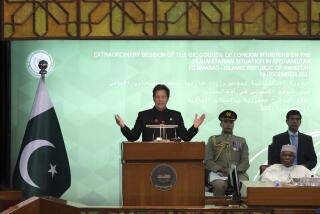Pompeo tries to shore up a rocky relationship in brief visit to Pakistan
- Share via
Reporting from Islamabad, Pakistan — Secretary of State Michael R. Pompeo used face-to-face meetings with Pakistani leaders on Wednesday to renew demands that they do more to stamp out Islamist militants and support a fledgling U.S. peace effort with the Taliban in Afghanistan.
In a six-hour visit to Islamabad, Pompeo and Gen. Joseph F. Dunford Jr., chairman of the Joint Chiefs of Staff, tried to shore up a troubled relationship that has been further strained by the Trump administration’s suspension of hundreds of millions of dollars in security assistance.
Pompeo met with Pakistan’s new prime minister, Imran Khan — a longtime critic of U.S. military policy in the region who recently said he would seek a “mutually beneficial” relationship — as well as with the foreign minister and army chief.
“I’m hopeful that the foundation that we laid today will set the conditions for continued success as we start to move forward,” Pompeo told reporters after the meeting.
But the meetings were brief — less than half an hour at Khan’s official residence and an additional 40 minutes at the Foreign Ministry — and appeared to have achieved little of substance.
Asked whether Pakistani leaders had made any firm promises that would allow for the resumption of security assistance, Pompeo said, “We’ve still got a long way to go, lots more discussion to be had.”
As the Trump administration attempts for the first time to open direct talks with the Taliban on ending the war in Afghanistan, it has sharpened demands for cooperation from Pakistan, which it accuses of covertly supporting the insurgent group. Pakistan denies the allegations and says the U.S. is attempting to deflect blame for its failures in Afghanistan.
The Pakistani Foreign Ministry issued a conciliatory statement after Pompeo left.
“The two sides agreed that present conditions in Afghanistan were conducive to intensifying efforts for a political settlement,” it read, adding that the Taliban leadership should “seize the opportunity for talks.”
For the first time in 17 years, there seems to be momentum toward a negotiated settlement in Afghanistan. Afghan President Ashraf Ghani has offered amnesty to Taliban leaders who sit down for peace talks, and declared two temporary cease-fires with the militant group this year, one of which the Taliban reciprocated.
In July, the Taliban said it met with Alice Wells, the top State Department official for South Asia, in the Persian Gulf nation of Qatar, the highest-level contact between the U.S. government and the militant group it has been battling since 2001. The talks were described as preliminary but “useful.”
But the most challenging factor in any peace bid remains Pakistan, where the powerful military establishment is widely believed to have orchestrated the neophyte Khan’s election victory to ensure it retains authority over security affairs, including any resolution in Afghanistan.
State Department spokeswoman Heather Nauert said Pompeo “emphasized the important role Pakistan could play in bringing about a negotiated peace in Afghanistan, and conveyed the need for Pakistan to take sustained and decisive measures against terrorists and militants threatening regional peace and stability.”
Despite the rancor toward Pakistan displayed by President Trump — who accused the country of “lies & deceit” in a New Year’s Day tweet — Pakistani officials described the visit as cordial.
“There was nothing negative in today’s meetings,” Pakistani Foreign Minister Shah Mehmood Qureshi told reporters afterward. “There was an environment of understanding and it is a great step, in light of the relationship during the past year.”
Other Foreign Ministry officials said that Pakistani leaders pushed back when Pompeo asked them to take more serious steps to crack down on militant groups based on their soil. Pakistan has long used proxy Islamist groups to enforce its strategic interests in Afghanistan and India.
“We have categorically told them that Pakistan is not simply surrendering to the Americans’ demands only,” said one Foreign Ministry official, who spoke on condition of anonymity in discussing the private meeting.
Pakistan has been stung by the reduction in security assistance, part of which it describes as reimbursement for costs it has incurred in supporting the U.S. war effort in Afghanistan. Some commentators noted that when Pompeo and Dunford landed at the airport, they were greeted not by their counterparts but by a lower-level Pakistani Foreign Ministry official.
Pompeo said before arriving in Islamabad that the U.S. hasn’t seen Pakistan take actions “that would be sufficient for us to have advocated for turning back on that financial support.”
Hamayun Khan, a foreign policy analyst in Islamabad, said Pompeo’s visit was about little more than “theatrics.”
“It was a repetition of the same old from the U.S., and Pakistan reiterated its stances and sacrifices it’s made in the war on terror, and its help in Afghanistan,” Khan said. “In my opinion we should have not very high hopes from this visit.”
Special correspondent Sahi reported from Islamabad and Times staff writer Bengali from Mumbai, India. Times staff writer Tracy Wilkinson in Washington contributed to this report.
Shashank Bengali is South Asia correspondent for The Times. Follow him on Twitter at @SBengali
More to Read
Sign up for Essential California
The most important California stories and recommendations in your inbox every morning.
You may occasionally receive promotional content from the Los Angeles Times.











